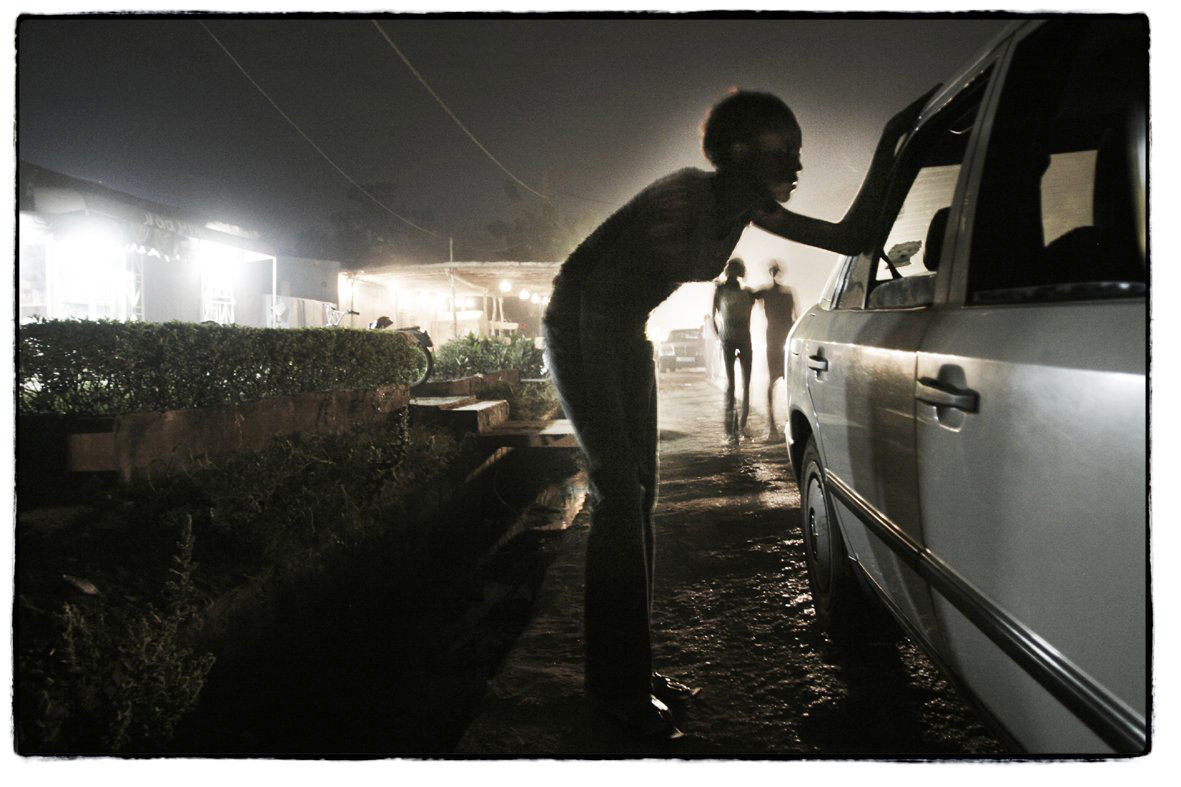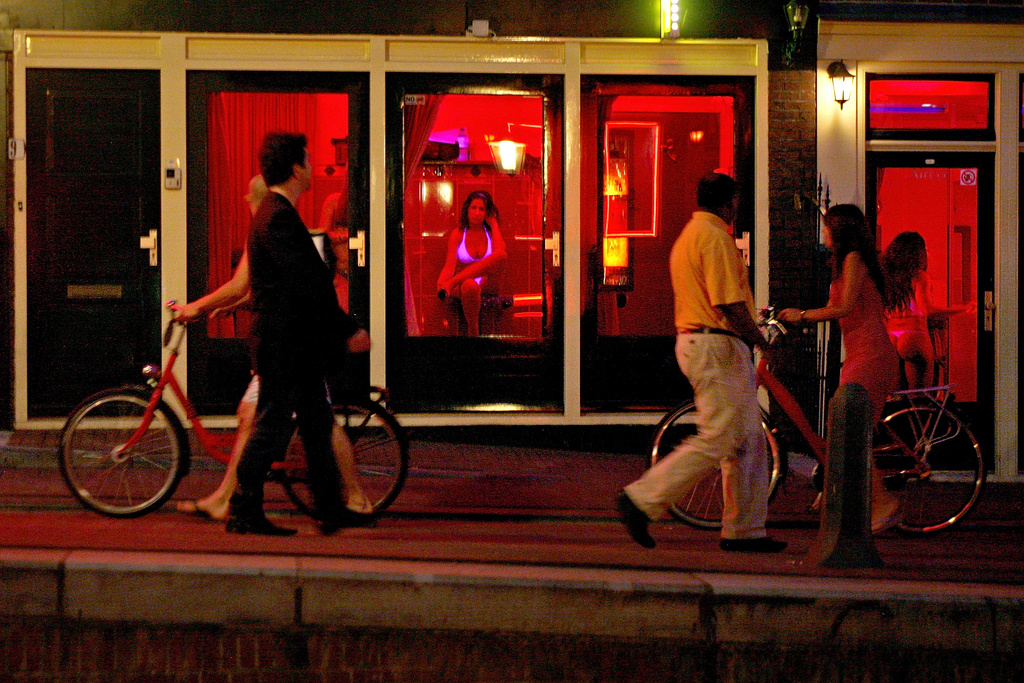Preventing teenage prostitution in Mali

Prostitution is not a respectable profession in Mali, but it is a flourishing one, with poverty pushing many women, even girls as young as 12, into selling their charms.
A Swiss woman and two Malians run an organisation to help sex workers with the many problems they face, including their health and the care of their children.
“Here, the woman’s sexual pleasure doesn’t count for much, and as a result she thinks of sex as an economic transaction,” Sylvia Sangaré Mollet told swissinfo.ch.
“It’s customary for men to give their mistresses presents, but prostitutes are denounced and ostracised.”
Mollet, a 49-year-old from Basel, visited Mali in 1992 to study youth prostitution. That’s where she met her husband, a Malian who works as a legal adviser.
Two years later the couple founded the organisation Danaya So with a Malian prostitute who has since died of Aids. Caritas Switzerland is one of the international organisations supporting the project, and Mollet is now its delegate in Mali.
Today, Danaya So has 3,000 members – and only prostitutes can join. The goal is not to get them off the game, but to help each other.
The organisers are women in the trade who go around brothels and red-light districts to make their colleagues aware of the risks of Aids and to inform them of their rights.
“The strength of Danaya So is that its staff come from the street and know where to go looking for the girls. The organisation therefore has access to illegal workers, who make up 60 per cent of sex workers in Mali. The other 40 per cent work in brothels,” Mollet said.
Getting younger
“The problem is that the prostitutes are increasingly young. The old ones, ex-prostitutes who look after the children, start putting make-up on girls as young as 12 and send them out onto the street,” she said.
“Early marriages mean paedophilia just isn’t seen as an issue.”
With the aim of getting the children out of the business, in 1997 Danaya So launched the Lakana So programme.
Children of prostitutes have an 80 per cent chance of ending up on the streets themselves, according to Mollet – not knowing who their fathers are, they don’t have a birth certificate and as a result can’t go to school.
The first thing Lakana So does is to obtain a birth certificate by remedial order to be able to send the children to school and find them an apprenticeship.
Sex ed
“I started when I was 13,” said F.T., a former prostitute with Aids who prefers to remain anonymous for the sake of her three daughters, each by a different father.
“I got pregnant and my boyfriend left me. When my father died, my mother took my sisters to Ivory Coast and left me behind. An old woman then sent me into a brothel where, at the time, you could often earn 15,000-20,000 CFA francs a day. It was 500 CFA francs a trick; today it’s 1,000 (SFr1.85),” she said.
“I’m known in all the brothels in Bamako. Sylvia found me in one in 1994 and took me on as an organiser.”
F.T. explained how when she goes on her rounds in bars, she smokes and gets dressed up like she did before – “otherwise people would get worried and think a mother had come to get her daughter”.
“I invite the girls to have a drink with me and then tell them about Danaya So. We also use a wooden penis to show them how to use condoms.”
All sorts of clients
F.T. has spent 20 years in brothels. “To get by, you drink whisky and take tablets sold by dodgy pavement pharmacies, which keep you awake. There are all sorts of clients – from market porters to rich men,” she said.
She doesn’t mince her words: people hide behind Islam, they go to the mosque, but 90 per cent frequent prostitutes and of the remaining ten per cent, three-quarters are unfaithful.
According to F.T., the majority of Malian women convert their charms into money –servants, schoolgirls and even married women, when their husbands don’t give them enough money to buy nice clothes.
“In Mali people marry for social reasons, not for love,” she added.
Prostitution risk
Mamadou Diakité, responsible for monitoring the education of the children of women who have joined Danaya So, says before religious holidays the number of illegal workers increases because they want to look nice for the festivals.
The girls go out with baskets on their heads to look as if they have something to sell, and show they are available by lifting a finger.
Diakité says most men have extramarital affairs. “It’s the selfish side of Malian men who want sex but don’t want to share with the woman. When a man sees a girl he likes, he doesn’t bother finding out her age,” he said.
Mollet says female street sellers and maids from poor families are in danger of gradually drifting into prostitution.
“They come to the city as teenagers to get a bit of money, which they send home. If they get pregnant and aren’t married, they’re ashamed to return to the village,” she said. She points out that these girls, who have no real training and are often illiterate, don’t have many alternatives to support themselves and their children.
Danaya So means “House of trust” in Bambara, Mali’s most widely spoken language. The name was chosen by the members.
It was set up in 1994, in the capital, Bamako, to improve the lives of the women concerned. It is also now present in the towns of Sikasso, Koutiala, Mopti et Ségou.
It employs 26 sex workers.
Danaya So has its own doctor’s surgery and agreements with other medical centres.
It has introduced a health card in brothels and offers medical insurance costing 500 CFA francs a month (SFr 0.80).
It organises information events to tell women about Aids, and sells condoms. The rate of infection in brothels has fallen from 70% in 1997 to 24% in 2009. Aids treatment is free in Mali.
The association also provides literacy classes, training and micro credit to help women who want to give up the sex trade. But it does not pressurise them into leaving.
Lakana So, or “House of guidance” was set up in 1997 to fight the sexual exploitation of minors. It provides schooling and professional training for the children of prostitutes.
It is supported by Caritas Switzerland and Caritas Luxembourg.
Mollet, 49, is originally from Basel.
Her husband is a Malian, and they have two daughters, aged16 and 8.
She studied social psychology at the Federal Institute of Technology, Zurich.
She has been in Mali since 1992.
At first she split her time between Mali and Switzerland, but has been permanently in Bamako since 2006.
She was the coordinator of Danaya So from 1994 to 1998.
Since 2008 she has been the representative of Caritas Switzerland in Mali.
(Translated from French by Thomas Stephens)

In compliance with the JTI standards
More: SWI swissinfo.ch certified by the Journalism Trust Initiative













You can find an overview of ongoing debates with our journalists here . Please join us!
If you want to start a conversation about a topic raised in this article or want to report factual errors, email us at english@swissinfo.ch.